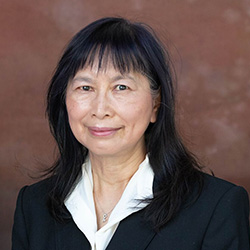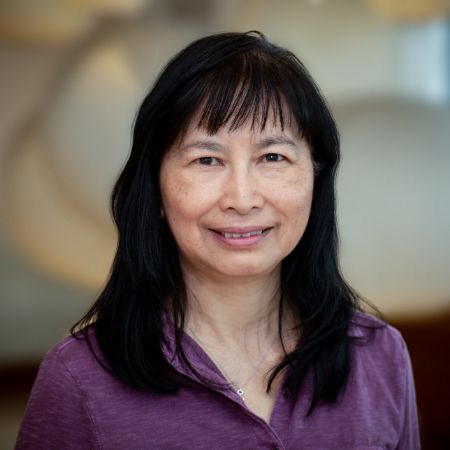Carol H Miao, PhD

- Academic Title: Professor, Pediatrics
- Research Title: Principal Investigator, Seattle Children's Research Institute
- Research Center: Center for Immunity and Immunotherapies
"My ultimate goal is to develop treatments that take away the pain that may come along with a childs genetic disease. Everyday, this guides my work to find one-time curative therapies for conditions like hemophilia. I love medical research and the opportunities it provides to make significant impacts on the lives of children and their families."
-
Biography
Carol H. Miao, PhD, is a principal investigator in the Center for Immunity and Immunotherapies at Seattle Childrens Research Institute, and a professor in the Department of Pediatrics at the University of Washington School of Medicine.
Dr. Miaos research focuses on the development of better treatment for hemophilia patients and gene therapy strategies for treating genetic diseases. Her study was the first to use non-viral naked DNA delivery to achieve phenotypic correction in hemophilia A and B mouse models. Dr. Miao has been awarded funding support by National Institutes of Health, National Hemophilia Foundation, American Heart Association, Bayer Hemophilia Foundation and others. Currently her group is pursuing the following major research programs: development of safe and more efficient gene therapy approaches suitable for clinical applications including nonviral ultrasound-mediated gene delivery and direct bone marrow transduction using lentiviral gene transfer methods; and development of immunomodulation strategies involving immunosuppressive regimens and adoptive regulatory T cell therapy for treating inhibitory antibodies following gene or protein replacement therapy. Dr. Miao is active in many regional, national and international scientific societies; she is on the editorial board of Molecular Therapy and other scientific Journals and serves on NIH study sections and other review duties.Clinical Interests
Gene Therapy, immunomodulation, Hemophilia, Primary Immune Deficienices, Wiskott-Aldrich Syndrome, Ultrasound-mediated gene transfer, Cell therapy, regulatory T cells, Immunosuppression, nonviral gene transfer, lentiviral vectors
Research Description
The Miao Lab is currently focused on the development of gene therapy strategies for treating genetic diseases and immunomodulation protocols to overcome immune responses following gene or protein replacement therapy. Two prominant gene therapy model systems were investigated: hemophilia and primary immunodeficiency disease (PIDD).
1. Nonviral gene delivery for hemophilia.
The study from our lab is the first to demonstrate that phenotypic correction in hemophilia A and hemophilia B mouse models can be achieved by nonviral naked DNA delivery.
I. Ultrasound-mediated gene delivery. We have demonstrated that nonviral gene transfer of factor IX plasmid into the liver achieved long-term and therapeutic-level gene expression, leading to a complete phenotypic correction in hemophilia B mice by a hydrodynamic-based method. Liver-directed gene transfer of naked factor VIII plasmid also produced high-level factor VIII expression. In order to develop a clinically feasible method, we recently showed that ultrasound can significantly enhance gene transfer of naked plasmid in the presence of microbubbles (MBs, contrast agents). The enhancement was associated with the significant increase of cellular DNA entry induced by an ultrasound/MBs-mediated cavitation effect. We continue to optimize and modify different ultrasound parameters as well as develop targeted and more effective MBs for ultrasound-facilitated gene delivery to achieve the greatest enhancement with our collaborators at Applied Physics Laboratory of University of Washington. Next step will be to test this gene delivery method in larger animal models including rats and dogs.
II. Cell permeable peptides (cpps) and receptor-mediated gene delivery. We have previously screened various cell permeable peptides (cpps) for in vivo gene delivery efficiency. Although this peptide-mediated gene delivery is less efficient than hydrodynamics-based gene delivery, this method is much safer. We are also in the process of combining the carrier-DNA complexes with ultrasound-mediated gene delivery to further enhance the gene transfer efficacy. Furthermore, with our collaborators, we have developed a factor IX variant with much higher specific activity. By incorporating this factor IX variant into our liver-specific gene expression cassette in the nonviral vector, it is anticipated that therapeutic levels of factor IX may be achieved by the combined approach.
2. Drug and cell immunotherapy for modulating immune responses following replacement therapy.
The development of inhibitory antibodies is a major complication following protein replacement therapy for hemophilia. Approximately 30percent of hemophilia A patients developed inhibitory antibodies against FVIII after repeated infusions of protein concentrates. This problem is also predicted to occur following gene therapy treatment. Our laboratory is taking several approaches to combat this problem.
I. Monoclonal antibody therapy. We have previously shown that nonviral gene transfer of a liver-specific FVIII plasmid produced persistent, supra-physiological/therapeutic levels of FVIII in immunodeficient mice using a hydrodynamics-based delivery method. However, robust FVIII-specific immune responses occurred in immunocompetent hemophilia A mice and eliminated functional FVIII two weeks following gene transfer. This murine model permitted us to evaluate effective immunosuppressive regimens in combination with nonviral gene therapy to achieve a long-term therapeutic effect. Our previous studies showed that compared to non-specific immunosuppressive agents including rapamycin (RAP), cyclosporine A (CSA), cyclophosphamide, and Mycophenylate mofetil (MMF), monoclonoal antibody (mAb) therapies were demonstrated to be safer and more effective to prevent antibody response in plasmid-treated animals. Effective regimens include a combination of CTLA4-Ig and anti-murine CD40 ligand mAb (MR1) or single agent anti- inducible costimulator (ICOS) or T cell depleting anti-CD3e antibody. Persistent expression of therapeutic levels of FVIII (50-150percent) was achieved, indicating the establishment of long term tolerance to FVIII. Among these, modulation regimen by anti-ICOS is closely associated with the early depletion of CD4+ T cells and production of regulatory T cells (Tregs) following treatment. We are in the process of studying the mechanisms of tolerance induction by different regimens.
II. Regulatory T cell therapy. It has recently been demonstrated that CD4+CD25+Foxp3+ regulatory T (Treg) cells play a critical role in the regulation and suppression of autoimmune and alloimmune responses. Our preliminary data showed that an adoptive transfer of transgenic CD4+Foxp3+ regulatory T (Treg) cells significantly reduced anti-FVIII antibody titers in FVIII plasmid-treated HemA mice. We are currently devising strategies to induce and expand FVIII-specific Tregs from FVIII-specific T responder cells and test if adoptive transfer of these cells will effectively prevent the formation of inhibitory antibodies in the recipient animals following plasmid challenge or repeated infusions of FVIII protein.
III. Combination of drug and cell immunotherapy. In order to modulate pre-existing anti-FVIII antibodies, we plan to further improve and/or combine drug and cell therapy. The goal is to eliminate pre-existing anti-FVIII antibodies and induce long-term tolerance to FVIII.
3. Lentiviral gene therapy for Wiskott-Aldrich Syndrome.
We have developed several lentiviral-WASp plasmids by incorporating either retroviral MND promoter or endogenous WASp promoter and several strong enhancer/LCR elements to restrict enhancer/promoter activity to appropriate cells. In addition, a defined insulator element was incorporated into these vectors to reduce the occurrence of promoter silencing and the risk of enhancer mediated mutagenesis events. The expression profile of pan-hematopoietic and lineage-specific vectors are being compared in human cell lines representative of the lymphoid (B, T, NK), megakaryocytic, myeloid, and erythroid lineages. Furthermore, vectors (with and without flanking insulators)-mediated WAS expression and rescue of WAS dependent function will be compared in transformed human T-cell lines and primary T cell populations.Research Focus Area
Biochemical Genetics, Blood Disorders, Immunology
-
Related Resources
-
The Miao Lab is pursuing safer, more effective treatments for hemophilia. Our current work focuses on innovative gene therapy approaches.
-
-
Patient Testimonials
-
Awards and Honors
Loading...Award Name Award Description Awarded By Award Date {{ award.name }} {{ award.description }} {{ award.organization }} {{ award.displayDate }} No Awards and Honors found for Carol H Miao, PhD
-
Publications
Loading...No Publications found for Carol H Miao, PhD
-
Presentations
Loading...Presentation Title Event Location Date {{ presentation.title }} {{ presentation.presentedAt }} {{ presentation.location }} {{ presentation.displayDate }} No Presentations found for Carol H Miao, PhD
-
Research Funding
Loading...Grant Title Grantor Amount Award Date {{ funding.title }} {{ funding.grantedBy }} {{ funding.amount }} {{ funding.displayDate }} No Research Funding found for Carol H Miao, PhD
-
Clinical Trials and Research Studies
Loading...{{ item.st }}
No clinical trials found for Carol H Miao, PhD.
